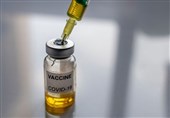Experimental Drug Prevents 79% of COVID-19 Cases Progressing in Trial
TEHRAN (Tasnim) – Researchers trialing an experimental drug on critically ill coronavirus patients say it prevented their disease from progressing in 79% of cases.
The experimental drug known as SNG001 is an inhaled formulation of beta-interferon developed by the pharmaceutical company Synairgen and was given to patients in hospital with COVID-19 who needed oxygen assistance.
Although the treatment had already been shown to improve the recovery of asthma and COPD (chronic obstructive pulmonary disease) patients who had other lung infections, such as flu, it was not known if it would help coronavirus patients.
The trial was conducted on a double-blind and placebo-controlled basis meaning neither the researchers nor the patients knew whether they were receiving SNG001 or a placebo.
It found the number of patients who ended up developing the most severe form of the disease - to the point where they required ventilation or they died - was reduced by 79% for those taking SNG001 compared with those on the placebo.
Patients who received SNG001 were also more than twice as likely to recover over the course of the treatment period, meaning they suffered no limitations on their normal activities, than those on the placebo.
Three people who took part in the trial died after being randomly assigned to the placebo, Synairgen confirmed. There were no deaths among those patients treated with SNG001.
The drug is an inhaled formulation of beta-interferon which a naturally occurring protein that orchestrates the body's anti-viral responses, and is also used to treat the auto-immune disease Multiple Sclerosis.
Scientists believe it will prevent the coronavirus from taking over lung cells to make further copies of itself.
Professor Tom Wilkinson, the chief investigator on the trial and a professor of respiratory medicine at the University of Southampton, said the team was "delighted with the positive data produced from this trial".
"The results confirm our belief that interferon beta - a widely known drug that, by injection, has been approved for use in a number of other indications - has huge potential as an inhaled drug to restore the lung's immune response, enhancing protection, accelerating recovery and countering the impact of SARS-CoV-2 virus."
Professor Stephen Holgate CBE, the professor of immunopharmacology at the University of Southampton, said recognizing that the coronavirus "is known to have evolved to evade the initial antiviral response of the lung" was a valuable insight, Sky News reported.
"Our treatment of giving high local concentrations of interferon beta, a naturally occurring antiviral protein, restores the lungs ability to neutralize the virus," added Professor Holgate, who is also the co-founder of Synairgen.
He said it would work on "any mutation of the virus or co-infection with another respiratory virus such as RSV or influenza, as could be encountered in the winter if there is a resurgence of COVID-19".






